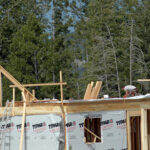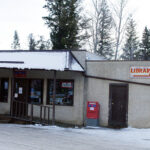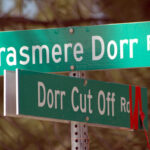Home »

Wilks gives candid take on life so far in Parliament
With Canada’s 41st Parliament adjourned until Jan. 30, Kootenay-Columbia MP David Wilks has been touring the riding, catching up with constituents, learning about issues and candidly describing his experiences in Ottawa since winning the May 2, 2011 federal election.
Wilks has moved his way across the expanse of the Kootenay-Columbia’s 63,381 km2 since the first week of the year, making stops in Elkford, Cranbrook, Jaffray, Nakusp, Revelstoke, Golden, Canal Flats, Creston and Fernie, among other locales.
On Jan. 4 he was welcomed by the Fernie Chamber of Commerce during its monthly luncheon at Park Place Lodge.
He detailed his first seven months in the nation’s capital with candor, noting with a smile that “it’s bureaucracy at its finest. It’s a game – but for the most-part, we play fair in the sandbox.”
Political life in Ottawa is a different world than municipal or regional politics, he said, pointing out the extensive use of scripting emanating from various ministries as an example.
Wilks also offered his take on Prime Minister Stephen Harper.
“I don’t know what the Liberal Party ever did to Stephen Harper – it must have been really bad,” he said. “His whole purpose in life” is to destroy the party that was almost beaten to curb in the last election, with the Tories seizing a majority and now deceased Jack Layton’s NDP capturing a record number of seats.
Wilks spent an hour speaking to the packed chamber luncheon, fielding numerous questions, including some of the difficult or ‘non-partisan’ variety.
A variety of federal topics were highlighted by Wilks, 52, who noted the two largest devourers of taxpayer dollars are National Defense and Aboriginal Affairs and Northern Development, areas he directed comments toward.
Canada is to remain in Afghanistan until 2014, but in the north which “is not as volatile as the south,” said Wilks, adding danger still remains for Canada’s troops. “The fact of the matter is we are in a war zone and people die.”
Wilks, whose son only recently returned from a tour of duty in Afghanistan, said he is doubtful that there will be any “fix” to the activities in that part of the world.
Despite a Dec. 31, 2014 withdrawal from Afghanistan, Canadian troops will likely just end up somewhere else in the world, he said, offering Syria or another “nuclear ready” state in the Middle East as such a destination.
Aboriginal Affairs and Northern Development committee, one of the two committees of which Wilks is a member, has been a steep learning experience, he said.
Amendments are being put forward for the Indian Act of 1873, which was enshrined in the 1982 Constitution, which is moving slowly, he said, for a reason. “No one wants the constitution to be re-opened,” he said, adding that would be the only way to make sweeping changes to the Indian Act of 1873, or before government could even look at phasing away Aboriginal Affairs and Northern Development.
First Nations Land Management, which 18 of Canada’s 571 First Nations have opted for, appears to be the future, Wilks said. However, B.C., with 338 of Canada’s First Nations, do not have “any agreement” aside from two treaties.
“I believe the Ktunaxa are getting closer to treaty,” Wilks said, adding he hopes Canada’s First Nations can be spared having to be stuck to such an old Act.
“Some of them (First Nations) have some huge potential,” he said, noting that many reserves around the country are in dire straits because “we as a society have enabled them since 1873.”
That led to a take on the Attawapiskat (Northern Ontario) situation, where images of severe poverty clash against the realization that vast sums of federal money is unaccounted for.
There is no reason any of the reserve’s 2,000 residents should be living in such conditions, Wilks said, pointing out that $74 million should have been available to Attawapiskat. He likened the figure to Fernie, which operates a city of almost 5,000 on an annual budget of $9.5 million.
Because of Attawapiskat, an amendment has been instituted in the Indian Act that forces First Nations to be accountable for money provided by Aboriginal Affairs and Northern Development.
“It’s an interesting committee to sit on, to say the least,” Wilks said.
Pressing home that work in Ottawa is a constant, Wilks provided updates on a variety of mayor Bills currently before Parliament, such as C-10, C-18, C-22 and C-25, among others.
Wilks informed the gathering about impending changes to the Fair Representation Act, which will increase the size of the House of Commons by 30 seats, with B.C., Alberta and Ontario getting the bulk of them.
Residents of the riding can expect changes, he continued.
“They are going to re-jig – they have to,” he said, predicting the riding to lose the northwestern end that includes Revelstoke and Nakusp and gaining area from Grand Forks and Central Kootenay.
The riding has a population of about 87,000 (not including resort areas shadow populations). It currently spans from the Big Bend of the Columbia River in the north, its western-most boundary probes into the north Central Kootenay and it flows south to the U.S. border from West Creston to the Alberta border.
Its main population centres are Cranbrook (20,000), Revelstoke (7,500), Kimberley (6,500), Creston (5,000) and Fernie (4,500).
More on David Wilks
Wilks was born in Lethbridge, Alta.
Wilks was with the Royal Canadian Mounted Police for 20 years, his entire term of duty spent in B.C. After retiring in 2000, he became owner of Sparwood Bowl and Billiards. Since then he served two terms as a councillor and then two terms as Sparwood’s Mayor, also serving as its director on the Regional District of East Kootenay board. Wilks was chair of the board for six months before he stepped aside to run for the Conservative Party nomination.
He replaced Jim Abbott, the long-time Conservative and Reform MP for the riding.
Wilks is currently a member of two Parliamentary committees: Aboriginal Affairs and Northern Development and Scrutiny of Regulations. He’s also an associate member of two dozen other committees.
For more go to: https://www.david-wilks.ca/
Ian Cobb/e-KNOW







